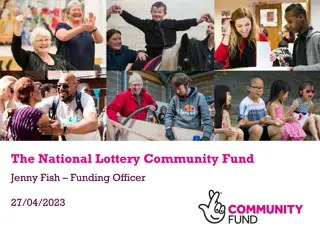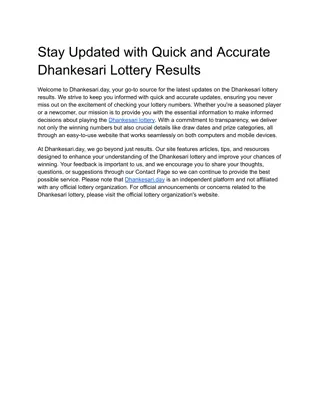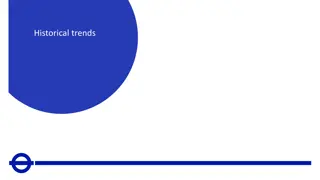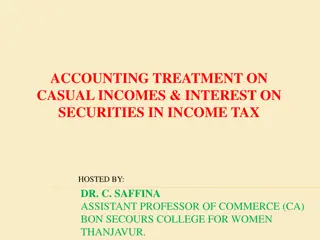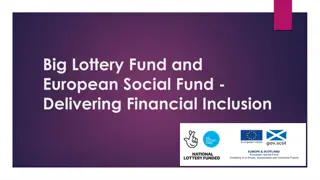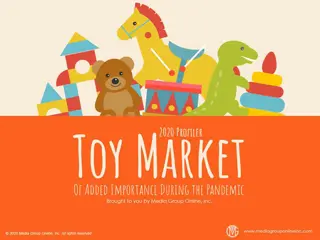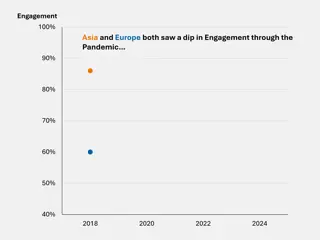Insights into the Lottery Industry Trends of 2019 and Pandemic Impact
The North American Association of State and Provincial Lotteries reported the lottery industry as a mega-winner in 2019, with record-breaking sales totaling $83.04 billion. However, the COVID-19 pandemic has stifled lottery play, leading to significant decreases in sales in various states. Mega Millions and Powerball emerged as key players in the big-game sector. Online lotteries and sports betting saw growth in 2019, with the potential for further expansion in the future. Lottery player demographics reveal surprising insights, with men dominating the sports-betting sector.
Download Presentation

Please find below an Image/Link to download the presentation.
The content on the website is provided AS IS for your information and personal use only. It may not be sold, licensed, or shared on other websites without obtaining consent from the author.If you encounter any issues during the download, it is possible that the publisher has removed the file from their server.
You are allowed to download the files provided on this website for personal or commercial use, subject to the condition that they are used lawfully. All files are the property of their respective owners.
The content on the website is provided AS IS for your information and personal use only. It may not be sold, licensed, or shared on other websites without obtaining consent from the author.
E N D
Presentation Transcript
The Industry Was a Mega-Winner for 2019 According to the North American Association of State and Provincial Lotteries (NASPL), total 2019 US sales of traditional games was $83.04 billion, a new annual record, and a 6.9% increase from 2018. Beneficiaries received a total of $25.1 billion, a 7.0% increase. The NASPL s report also included electronic gaming machines, table games and sports betting, which cumulatively added another $8.27 billion, or a grand total of $91.32 billion. An even more amazing record for 2019 was sales increased in all 45 state lotteries, with New York becoming the first US lottery to exceed $10 billion. Multiple states recorded double- digit increases for their traditional games.
The Pandemic Stifles Play Despite the coronavirus outbreak, most of the 45 states with lotteries are continuing play; however, many have closed their claims centers where employees and the public would normally interact, reduced lobby hours and/or cancelled promotional events. Multiple states have reported significant decreases in play and, therefore, sales and revenues, with Michigan -35% YOY for the week of March 24 as well as California, Pennsylvania, Iowa and Massachusetts, among others. Some anti-gambling lobbying groups are asking states to suspend their lotteries during the pandemic, as they are concerned a substantial portion of the federal government s stimulus money could be spent for lottery tickets, instead of family/household necessities.
Mega Millions and Powerball Lead the Big-Game Sector The 2019 Mega Millions winning jackpot of $1.5 billion and total sales of $5.31 billion were significant boosts to the industry, with the total just for Mega Millions increasing 63.6%, or $2.06 billion. Powerball, Lotto America and For Life games (Lucky for Life, Cash4Life and Win for Life) all experienced decreased sales, or -2.3%, -7.3% and -3.3%, respectively. During April 2020, both the Powerball Product Group and the Mega Millions Consortium indicated their future jackpots would be based on game sales and interest rates. The next Powerball will reset to $20 million and Mega Millions will have no guaranteed minimum.
Online Lotteries and Sports Betting Are the Growth Sectors During 2019, 13 of the 45 states with lotteries offered online and/or mobile options, but more states are expected to add them. Georgia, Kentucky, Michigan, New Hampshire and Pennsylvania have interactive, instant games online. The online gaming channel has been extremely important for many states during the pandemic, since all of their commercial and tribal casinos are closed. For example, online wagering in Pennsylvania increased 25% YOY during March 2020. Because states are now allowed to initiate sports betting legislation and operations, the 142.4% increase in sports betting during 2019 in the 17 states where it was legal is likely to increase significantly, as many as 40 states could make it legal by 2024.
Lottery Players Demographics Are Surprising In the sports-betting sector of the overall gaming industry, the primary demographic is men, at approximately 70%, and young men, specifically, but slightly more women than men purchased a lottery ticket during the past 4 weeks, according to The Media Audit. The Media Audit s September 2019 Aggregate Survey (57 US markets, more than 157 million adults) also reinforces the stereotype of mostly older adults playing the lottery, as they represent 54.6% of all who purchased a ticket. A fallacy The Media Audit s data refutes is most lottery-ticket purchasers live in low-income households, as 22% of ticket purchasers had a household income of $50K $75K, the single largest bracket, and 28.1% earned $75K $100K.
The Vice Made Nice As much as the gaming and lottery industries market their games with positive messages, gambling, (a term these industries don t typically use) is still lumped with other adult vices, such as smoking and alcohol and then there are the many illegal vices. According to an October 2019 Bankrate survey, respondents said they spent an average of $2,400 annually for lottery tickets, alcohol, tobacco (including e-cigarette) products and gambling, which, again, are just the primary legal vices. Men s annual spending for these vices was $3,205, compared to $1,670 by women. Although Millennials spent the most on these vices, or an annual average of $2,995, among all adults younger than 74, those 75+ spent the most, or $4,846.
Advertising Strategies As the retail establishments that sell lottery tickets reopen, state lotteries will want to reestablish their brand identity and positioning as a primary entertainment for many adults. State lotteries and those that offer sports betting are likely to still have many players at home, especially the large senior audience, so using other media, TV in particular, to promote the online alternative will continue to be important. The pandemic period (whatever its current status) may be a good time for lotteries to share one or more messages about gambling addiction since many people have been stuck at home. The stress and anxiety may have resulted in more of them turning to gaming.
New Media Strategies State and other lotteries may be able to regenerate sales by asking customers to record and upload short videos about their experiences playing online and what alternatives sports- betting enthusiasts found to replace the lack of sports. Lotteries can use social media to share their state or locales pandemic health and safety protocols to help generate traffic for the convenience stores and other retail establishments that sell most of the lottery tickets. Lotteries could use social media to promote donations from consumers to support community projects related to the pandemic. Consider matching half of each consumer s donation when they also buy a lottery ticket online.


